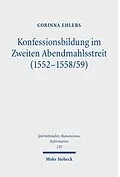The Second Eucharistic Controversy contributed significantly to the development of confessional boundaries between the Lutheran and the Reformed church. Drawing on previously neglected sources, Corinna Ehlers shows how a plurality of Protestant theologies and self-images slowly evolved into more clear-cut forms of confessional identity.
The Second Eucharistic Controversy (1552-1558/59) contributed significantly to the development of confessional boundaries between the Lutheran and the Reformed church. In her analysis, Corinna Ehlers points out that the theological debate about the Lord's Supper was also a conflict about the identity of the Reformation. The discussion was influenced by the situation of Protestants in other European countries as well as by political events within the Empire and local developments. Drawing on previously neglected sources, the study shows how a plurality of Protestant theologies and self-images slowly evolved into more clear-cut forms of confessional identity.
Autorentext
Geboren 1987; Studium der Evangelischen Theologie in Tübingen, Zürich und Jena; Kollegiatin im Graduiertenkolleg "Religiöses Wissen im vormodernen Europa" an der Universität Tübingen; Stipendiatin am Leibniz-Institut für Europäische Geschichte Mainz, seit 2018 wissenschaftliche Mitarbeiterin ebd., ab 2020 im Projekt "Europäische Religionsfrieden Digital" (Akademie der Wissenschaften und der Literatur Mainz); 2019 Promotion.
The Second Eucharistic Controversy (1552-1558/59) contributed significantly to the development of confessional boundaries between the Lutheran and the Reformed church. In her analysis, Corinna Ehlers points out that the theological debate about the Lord's Supper was also a conflict about the identity of the Reformation. The discussion was influenced by the situation of Protestants in other European countries as well as by political events within the Empire and local developments. Drawing on previously neglected sources, the study shows how a plurality of Protestant theologies and self-images slowly evolved into more clear-cut forms of confessional identity.
Autorentext
Geboren 1987; Studium der Evangelischen Theologie in Tübingen, Zürich und Jena; Kollegiatin im Graduiertenkolleg "Religiöses Wissen im vormodernen Europa" an der Universität Tübingen; Stipendiatin am Leibniz-Institut für Europäische Geschichte Mainz, seit 2018 wissenschaftliche Mitarbeiterin ebd., ab 2020 im Projekt "Europäische Religionsfrieden Digital" (Akademie der Wissenschaften und der Literatur Mainz); 2019 Promotion.
Titel
Konfessionsbildung im Zweiten Abendmahlsstreit (1552-1558/59)
Autor
EAN
9783161598999
Format
E-Book (pdf)
Hersteller
Genre
Digitaler Kopierschutz
Adobe-DRM
Dateigrösse
4.33 MB
Anzahl Seiten
666
Lesemotiv
Unerwartete Verzögerung
Ups, ein Fehler ist aufgetreten. Bitte versuchen Sie es später noch einmal.
